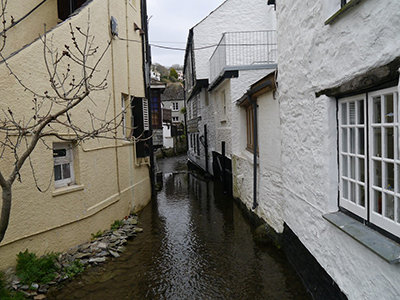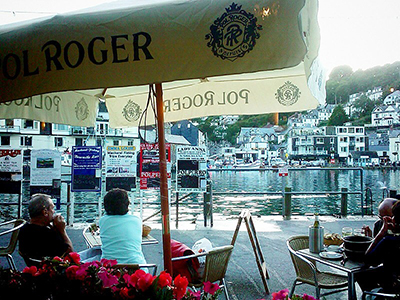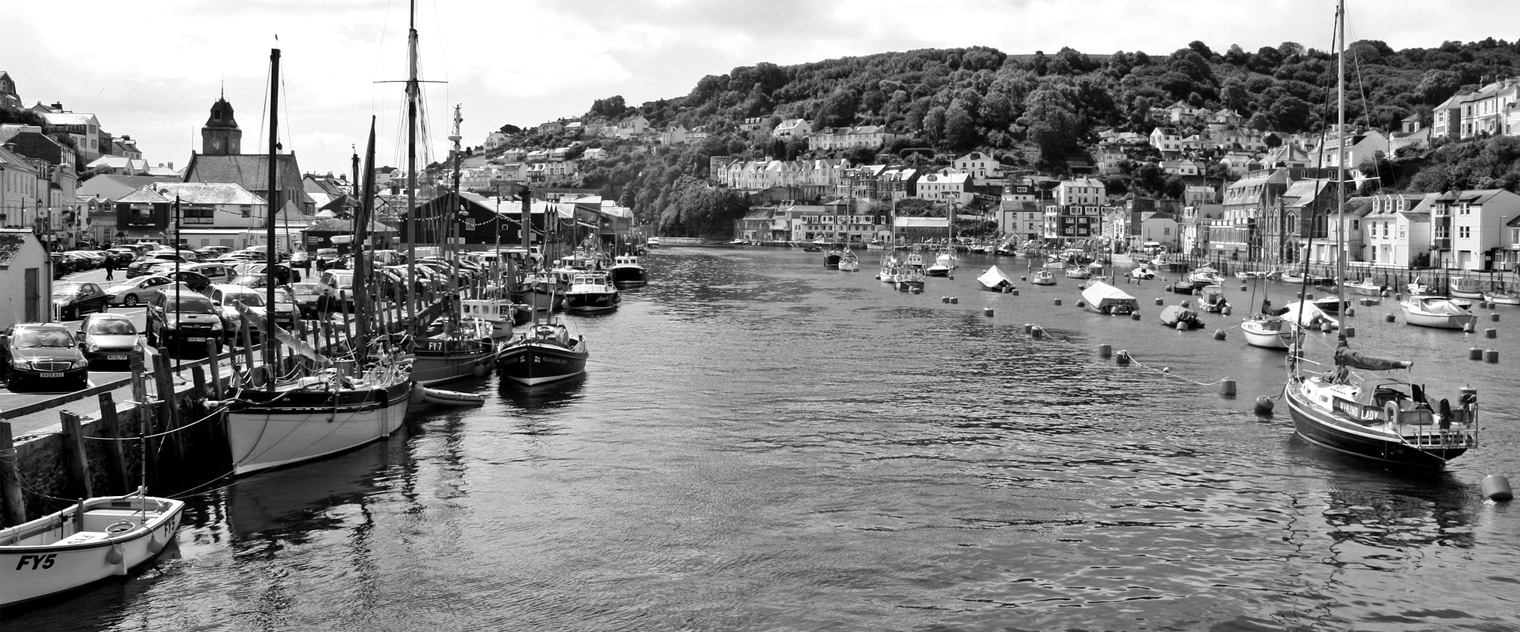Looe is the most frequently flooded place in the UK (Environment Agency, cited by Looe Flood Protection project, 2019). This flooding is a result of storm surges during high tides and these have been increasing over the past decades. It’s geographical vulnerability to the sea means that it will become further impacted by predicted sea-level rise as climate change continues.
 Looe, Cornwall, UK
Why is the sea level rising?
Looe, Cornwall, UK
Why is the sea level rising?
Global sea-level rise is happening because of two reasons: the melting of ice sheets in Greenland and Antarctica and thermal expansion, occurring as seawater density increases due to ocean warming so the water expands in volume (Humphreys, 2019). Over the period 1901-2010 global average sea levels rose 0.19 metres (IPCC, 2013). Predictions for future sea-level rise vary. The impact on varying levels of sea-level rise in different locations can be explored by looking at this map.
Sea level rise will have effects across the globe and around the coast of the UK, from major cities such as London to many smaller villages and towns. One place which is in the frontline of present and future sea-level rise is Looe in Cornwall.
The impact of sea-level rise on Looe?
Looe is a former fishing port on the coast of Cornwall, where the River Looe meets the sea. Its economy is dependent on tourism like many coastal villages in Cornwall. It also still has a thriving fish market. Families who live in the area are familiar with flooding from the sea when there is a high tide, and these have increased in recent years. Retired trawlerman Armand Toms, who represents Looe East on Cornwall council, has seen the town flood throughout his life. “If we get a metre more by the end of the century – is anything going to survive here?” (The Guardian, 2019)
 Looe, Cornwall, UK
In recent years flooding has caused damage to people’s homes and has eroded cliffs and beaches around the town. It is estimated that the town centre could flood up to 60 times a year by 2050, as sea levels and storms increase because of climate change. 1-metre sea rise by 2050 would overwhelm transport infrastructure, the fire station and health services (Hansard, 2019). The community is concerned about the viability of its tourist industry and the fish market if the flooding continues. The estimate for damages in Looe over the past 5 years is £39 million (Hansard, 2019).
Looe, Cornwall, UK
In recent years flooding has caused damage to people’s homes and has eroded cliffs and beaches around the town. It is estimated that the town centre could flood up to 60 times a year by 2050, as sea levels and storms increase because of climate change. 1-metre sea rise by 2050 would overwhelm transport infrastructure, the fire station and health services (Hansard, 2019). The community is concerned about the viability of its tourist industry and the fish market if the flooding continues. The estimate for damages in Looe over the past 5 years is £39 million (Hansard, 2019).
How will Looe adapt?
Cornwall and Looe see action to adapt to sea-level rise as a priority and local plans focus on the social and economic aspects, protecting the existing infrastructure and community, rather than allowing nature to take its course. The harbour authority consulted with the local community to devise the Looe adaption plan (Looe Flood Protection Project, 2019). This local participation is key to addressing sea-level rise adaption across the world and has been central to devising the plan in Looe. The plan has now expanded to input by Cornwall Council and Department for Environment and Rural Affairs (DEFRA) and focuses on protection measures for the housing and infrastructure in the town as well as incorporating economic regeneration plans (LFPP, 2019). The central part of the plan includes physical barriers such as tidal barriers and beach protections. Conservation of the sandy beach is noted as part of the maintenance and enhancement of tourism rather than as an environmental measure. The council has agreed on the adaption plan; however, funding has not been agreed. The project would cost £41million (Hansard, 2019).
 Trawlers on the Quay, Looe, Cornwall
Can coastal adaptation be afforded?
Trawlers on the Quay, Looe, Cornwall
Can coastal adaptation be afforded?
On a world map of vulnerability to sea level rise, the UK is marked as high risk. However, in a global context, it is not classified as the most at threat because it has the means to adapt i.e. it is a rich nation (Beck et al, 2014 and Burdett, M. 2018). The UK government only agreed on funding for 2015 to 2021 of £1.2bn for coastal erosion and sea-flooding projects despite the projected need of that the UK will be £1bn a year for 50 years on river and sea defences (Environment Agency, cited by The Guardian, 2019).
The UK government has prioritized areas of high population such as London. Local councils serving small coastal communities such as Looe are expected to raise money for their coastal adaption plans themselves. The Looe adaption project would cost £41million. £3.7million of this has been promised by the central UK government (Hansard, 2019).
The future for Looe?
Looe’s community is dealing with present and future risks and is having to make difficult decisions on the future for themselves and their families. The future for Looe remains uncertain.





Rate and Review
Rate this article
Review this article
Log into OpenLearn to leave reviews and join in the conversation.
Article reviews